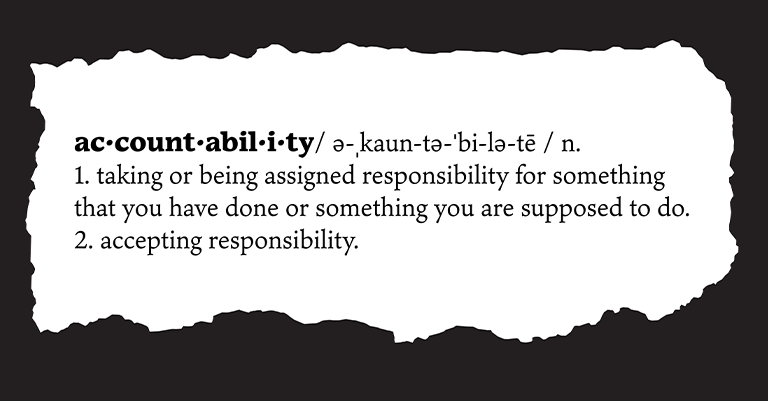Accountable leadership is essential for building strong relationships with teams. When leaders are responsible and accountable, they gain the trust and respect of their team members. This post will explore accountable leadership, why it matters, and how to become a responsible and accountable leader that secures lasting trust and respect.
What Is Accountable Leadership?

Accountable leadership is about owning decisions and taking responsibility for outcomes. It’s a leadership style where leaders don’t shift blame but face challenges head-on and make corrections when needed. This involves making commitments and following through with action. Accountable leaders make it clear that their decisions impact the entire team, and they lead by example.
Leaders who practice accountability show that they are reliable and trustworthy. They are transparent about their goals and expectations, ensuring everyone is on the same page. Their honesty strengthens team relationships because the team knows the leader is committed to success and learning from mistakes. This attitude creates an open culture where everyone feels valued.
Effective, accountable leaders don’t shy away from difficult situations. Instead, they step up, own the results, and make necessary improvements. This demonstrates strong leadership and makes team members more likely to trust their guidance. When leaders take accountability seriously, they set the tone for the entire team, encouraging others to take ownership of their roles.
Why Does Accountable Leadership Matter?
Accountability in leadership matters because it directly impacts how a team performs and how it views its leader. When accountable, leaders respect their team and care about how they perform. Accountability helps build trust because team members know their leader will stand by their word and support them when challenges arise.
On the other hand, a lack of accountability can damage a leader’s reputation and the team’s morale. When leaders fail to take responsibility, it creates an environment of uncertainty. Team members may feel unsure of their leader’s abilities and question whether they are genuinely invested in the team’s success.
Accountable leaders foster trust by being transparent and taking responsibility for successes and failures. They also create an environment where mistakes are seen as learning opportunities, not something to be feared. This builds respect, as team members know they work under a leader who values growth and improvement. When leaders practice accountability, they earn the respect of their team, which leads to stronger relationships and better performance overall.
Steps to Becoming an Accountable Leader
Becoming an accountable leader involves more than just admitting mistakes. It’s about setting clear expectations, following through on commitments, and consistently acting with integrity. Accountability helps leaders build strong, trusting teams and foster a positive work environment. Below are four key steps to help you grow as an accountable leader.

Set Clear Goals and Expectations
One of the foundational aspects of accountable leadership is setting clear, achievable goals for both yourself and your team. Without well-defined objectives, it’s easy for misunderstandings and misalignment to arise. To prevent this, start by clearly outlining what success looks like, the timeline for achieving it, and the individual roles each team member will play.
When setting expectations, be specific. Ambiguity leads to confusion and can prevent accountability. For example, instead of asking a team member to “improve communication,” clarify what that means: “I expect you to provide weekly status updates on project progress.” Setting clear goals helps ensure that both leaders and their teams know what is required of them, making it easier to hold each other accountable.
Clear goals also encourage transparency. When everyone knows what is expected, there is no room for excuses. This creates a culture of accountability where each team member feels responsible for their role in achieving success.
Be Transparent in Decision-Making
Transparency is key to gaining trust and ensuring accountability in leadership. When leaders make decisions behind closed doors or without providing clear reasoning, it can lead to confusion and a lack of trust among team members. To be an accountable leader, it’s important to explain the reasoning behind your decisions and the process that led to those choices.
By being open and honest about the challenges, risks, and rewards of decisions, leaders build trust with their team. Transparency also encourages a culture where team members feel comfortable asking questions and offering input. This openness allows everyone to stay aligned and understand how their work contributes to the bigger picture.
When leaders are transparent, they also model behavior that they expect from their team. This two-way accountability strengthens the relationship between the leader and team members, fostering mutual respect.
Take Responsibility for Mistakes
No leader is perfect, and mistakes will happen. What sets accountable leaders apart is how they handle those mistakes. Instead of deflecting blame or making excuses, accountable leaders take full responsibility for their actions. Admitting to mistakes not only builds credibility but also shows that the leader is committed to growth and improvement.
When leaders own up to their errors, it creates a safe space for the team to do the same. This openness can lead to valuable lessons and improvements, both for the leader and the team. Accountability starts at the top, and when leaders take responsibility for their actions, it encourages a culture of honesty and learning.
Additionally, taking responsibility involves following up on the mistake with a plan for correction. Leaders should be prepared to fix what went wrong and ensure that similar mistakes don’t occur in the future. This proactive approach further builds trust and respect within the team.
Provide Regular Feedback and Follow-Up

Accountable leaders don’t just set expectations and walk away—they provide ongoing feedback to ensure their team is on the right track. Feedback is an essential part of accountability, as it helps guide team members toward improvement and reinforces their strengths. Leaders should schedule regular check-ins to discuss progress, challenges, and any necessary adjustments to stay aligned with goals.
When giving feedback, be specific and constructive. Instead of vague statements like “Good job,” focus on specific behaviors or outcomes: “Your report was thorough, and I appreciate how you presented the data clearly.” Providing actionable feedback helps team members understand what they’re doing well and where they can improve.
Equally important is following up. Accountability is ongoing, and leaders should regularly assess the progress toward goals. By staying involved and offering consistent support, leaders demonstrate that they are invested in their team’s success and hold themselves accountable for guiding the team effectively.
How Accountable Leadership Builds Trust and Respect
Accountability is the foundation of trust in leadership. When leaders consistently demonstrate accountability, they show they are dependable, which builds trust within the team. Team members can count on an accountable leader to follow through on commitments and act with integrity. This sense of reliability fosters confidence in the leader’s decisions, creating a strong bond of trust.
Respect is earned when leaders stand by their word and lead by example. Accountability fosters respect because it shows that leaders are willing to take ownership of their actions, even in difficult situations. A leader who admits mistakes and works to correct them earns the respect of their team by demonstrating humility and responsibility.
Accountability also creates a culture where both leaders and team members hold each other responsible for their actions. This mutual accountability strengthens the overall dynamic, encouraging open communication and transparency. Leaders who are transparent about their decisions and intentions foster an environment of trust, where team members feel respected and valued.
Consistency is key in maintaining trust and respect. Leaders must regularly demonstrate accountability to reinforce these values. A single instance of accountability is not enough—team members need to see their leader consistently taking responsibility and being reliable over time.
Accountability is essential in building trust and respect. When leaders act with integrity, admit mistakes, and maintain transparency, they set the standard for the entire team. This creates a strong, respectful working environment where both trust and respect thrive.
Common Mistakes That Undermine Trust and Respect

Avoiding Responsibility
One of the most damaging mistakes a leader can make is avoiding responsibility when things go wrong. When leaders fail to own up to their actions or shift the blame to others, they lose credibility. Team members begin to question the leader’s integrity and may doubt their leader’s commitment to their growth or success. This can lead to disengagement, as employees lose faith in their leader’s honesty and reliability.
Lack of Clear Expectations
Failing to set clear expectations is another common mistake that undermines trust. Without a clear vision or specific goals, confusion can spread throughout the team. Employees are left unsure of what they need to achieve or how to measure their progress. This lack of direction causes frustration and erodes trust in the leader’s ability to effectively guide the team, leaving members feeling unsupported and unmotivated.
Failure to Follow Through on Promises
Leaders who don’t follow through on promises risk damaging the respect they’ve earned. Trust is built on consistency, and when a leader says one thing but does another, it creates doubt and disappointment. Even small broken promises can send the message that the leader cannot be relied upon, weakening the relationship between the leader and the team over time.
How to Avoid These Mistakes
Avoiding these common leadership mistakes is essential for maintaining trust and respect. By taking responsibility, setting clear expectations, and consistently following through on commitments, leaders can foster a strong, dependable relationship with their team, which is crucial for long-term success.
How Accountable Leadership Maintains Trust and Respect Over Time

Maintaining trust and respect as a leader is not a one-time task; it requires ongoing commitment and effort. Trust is built gradually through consistent actions, clear communication, and transparency. Leaders who prioritize accountability in their decisions and behaviors are better able to sustain these vital leadership qualities over time.
Consistency Is Key
Maintaining trust and respect as a leader is not a one-time effort; it requires ongoing commitment. Trust is built gradually through consistent actions, clear communication, and transparency. Leaders prioritizing accountability can better sustain trust and respect over time by demonstrating reliability and integrity in their decisions and behaviors.
Continuous Communication
One of the most important ways to maintain trust is through continuous communication. Leaders should regularly check in with their teams, ensuring goal alignment and addressing any concerns early. Consistent feedback, both positive and constructive, helps team members feel valued. Open communication shows that the leader is approachable and dedicated to the team’s progress, helping prevent misunderstandings before they can damage trust.
Adaptability and Openness to Feedback
Leaders need to stay adaptable and embrace feedback to sustain respect over time. Actively seeking input from team members reflects a commitment to growth and improvement. This openness to listen and make changes based on feedback shows humility and strengthens respect, as the leader remains dedicated to serving the team’s needs and evolving alongside them.
Follow Through on Commitments
Upholding commitments is crucial for maintaining both trust and respect. When leaders consistently follow through on promises, even in challenging situations, they show integrity. Inconsistent behavior can quickly erode trust, so it’s essential for leaders to demonstrate that they can be relied upon to do what they say.
The Importance of Accountability
Maintaining trust and respect requires consistency, open communication, and a genuine willingness to learn and adapt. By practicing accountability and staying engaged with their team, leaders can foster long-lasting relationships built on mutual trust and respect.
Closing Thoughts on Accountable Leadership

Accountable leadership is essential for building trust and respect within a team. Leaders who consistently demonstrate accountability, take responsibility for their actions and communicate openly foster an environment of transparency and reliability. This inspires confidence and strengthens relationships, creating a strong, cohesive team.
To secure lasting trust and respect, leaders must set clear expectations, admit mistakes, and maintain consistency in their decisions and actions. These behaviors set the standard for accountability, encouraging team members to take ownership of their roles and contribute to the team’s overall success.
Ultimately, accountable leaders cultivate a culture of mutual trust, respect, and growth. Leaders can inspire loyalty and drive long-term team success by staying consistent, transparent, and adaptable.
Next Steps
Accountable leadership is about more than taking responsibility—it’s about setting a standard others can follow. Here are three actionable tips to help leaders build trust and respect within their teams by fostering accountability. These practical steps will ensure clear communication, responsibility, and consistency.
- Set Clear and Specific Expectations: Communicate goals and responsibilities clearly to your team. Define what success looks like for each task or project and ensure everyone understands their role. This clarity prevents misunderstandings and fosters accountability across the board.
- Take Responsibility for Outcomes: Own the results if your team experiences success or failure. Admit mistakes when they occur and focus on finding solutions rather than placing blame. This openness builds trust and shows your commitment to the team’s growth.
- Maintain Consistency in Words and Actions: Follow your promises and lead by example. Consistency in your actions reinforces trust over time and sets a high standard for the team. Show that accountability is a core value through everyday decisions and communication.




